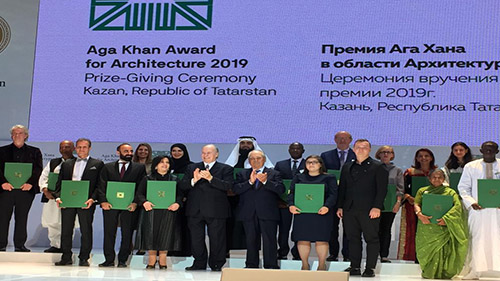13 September 2019
H.E Shaikha Mai Receives The Aga Khan Award for Architecture 2019, H.E : Leadership support to culture contributes to the promoting the Kingdom r regionally and internationally


From Kazan, Russia, Muharraq city’ cultural fame echoed around the world when H.E Shaikha Mai bint Mohammed Al Khalifa, President of the Bahrain Authority for Culture and Antiquities (BACA) and Chairman of the Board of Trustees of Shaikh Ebrahim Bin Mohammad Center for Culture & Research’s was conferred the 2019 Aga Khan Award for Architecture, on 13 September 2019, by Prince Karim Aga Khan for BACA’s “Revitalization of Muharraq” Project. The award-distribution ceremony was held at the Tatar Musa Jalil State Academic Theatre of Opera and Ballet, in the presence of former Tatarstan Republic President, Mintimer Shaimiev. The ceremony also featured the honoring of the “Revitalization of Muharraq” Project’s work team, represented by engineers Noora Al-Sayeh and Ghassan Al-Shemali, as the well as the honoring of five other projects from Arab and Islamic countries.
Speaking for the occasion, H.E Shaikha Mai asserted that “ Muharraq city winning the prestigious Aga Khan award is the fruitful outcome of the tremendous efforts exerted for years to revitalize Bahrain’s old towns and cities, especially Muharraq, a city that is gaining a global importance year after year”, adding that “ investment in culture is our path taken to achieve sustainability, and to stress the fact that culture is real resisting endeavor”.
H.E Shaikha Mai also affirmed that Bahrain’s continuous cultural achievements are the result of the support of the kingdom’s leadership, led by the first supporter of culture, His Majesty King Hamad bin Isa Al Khalifa, May God Protect Him, noting that the royal support has contributed to promoting Bahrain’s reputation as a regional and global centre for culture.
H.E extended thanks to the officials and jury of the 2019 Aga Khan Award for Architecture for their confidence in the "Revitalization of Muharraq” Project, and constant support for architectural projects aimed at shedding light on exceptional sites across the Arab and Islamic worlds.
BACA’s President lauded the constructive partnership and stressed the importance of fruitful cooperation between the public and private sectors in Muharraq, citing the efforts of the Shaikh Ebrahim bin Mohammed Al Khalifa’s Centre for Culture and Research since 2002. Then, a wider cultural activities and projects were initiated as a series of restoration and adaptive reuse of a number of edifices under the Shaikh Ebrahim Centre for Culture and Research, namely “Pearling Path, Testimony of an Island Economy”, UNESCO World Heritage, carried out by BACA and expected to be finished next year.
H.E argued that reason behind the revitalization of historical cities is bring back its authentic flavor and genuine beauty, adding that the project both highlights the town’s pearling history and aims to re-balance its demographic makeup, enticing local families back through improvements to the environment and provision of community and cultural venues. Facilitated by private–public partnerships, it involves the preservation of a number of sites and numerous buildings, from humble divers’ houses to prestigious courtyard residences to commercial warehouses; plus the upgrading of other façades, and the construction of four new buildings. All of these are connected through a visitor pathway, with vacant plots left by demolitions landscaped as public spaces. The preservation/restoration of the traditional buildings included reinstating lost wind towers for natural climate control.
The preservation/restoration of the traditional buildings included reinstating lost wind towers for natural climate control. The materials employed match the originals – notably coral stone reused from demolished structures, and wood. Terrazzo, which became popular in the area in the 1940s for flooring, is utilized extensively for street furniture, and contains flecks of oyster shell. Spherical white streetlamps atop terrazzo posts bring further pearl-related symbolism and assist way-finding.
Worth to mention that The 2019 Aga Khan Award is not a first major international award recognition testimony of the city of Muharraq as genuine historical, cultural, architectural and urban fabrics’ hub, given that in 2018, the city was celebrated as the Capital of Islamic culture for a whole year. During 2018, a series of cultural projects, such as the inauguration of Pearling Path Visitor Center, a UNESCO World Heritage site. In 2010, Bahrain was present in the trophies and awards world, winning the 2010 Venice Biennale, as the first Arab country to be honored with the Golden Lion Award for Bahraini fisherman’s hut on the shoreline, basically inspired by urban elements form the city of Muharraq.
The city of Muharraq also hosts many new buildings respect the historic environment’s scale and street lines while making bold contemporary architectural statements. In addition to the Pearling Path Visitor and Shaikh Ebrahim Center Centre and the House of Architectural Heritage that adopt a Brutalist aesthetic, Bahrain Culture Authority manages many other important cultural venues in the city, such as Al-Hidaya al Khalifiya School, Al-Khalifiya Library. The 2015 Milano Expo Archaeologies of Green pavilion features a series of interlinking gardens containing indigenous plants; and the Dar Al Jinaa Centre for Traditional Music is inventively cloaked in chain mail, shielding against solar glare while allowing a constant breeze. Music events here and elsewhere in the programme include performances of pearl-fishers’ songs.
It is to be noted that the Aga Khan Award winners, in addition to the “Revitalization of Muharraq”, are “ Arcadia Education Project” in South Kanarchor (Bangladesh), Palestinian Museum in Birzeit (Palestine), Public Spaces Development Programme in the Republic of Tatarstan, Alioune Diop University Teaching and Research Unit in Bambey (Senegal) and Wasit Wetland Centre in Sharjah (UAE).







